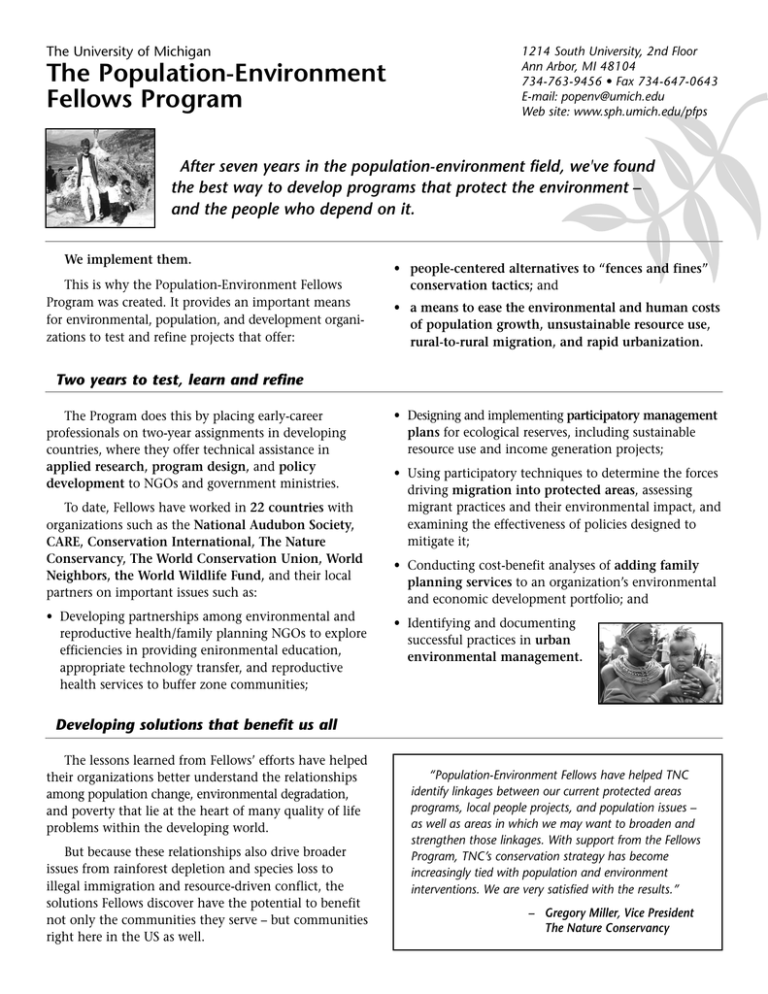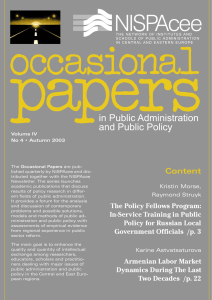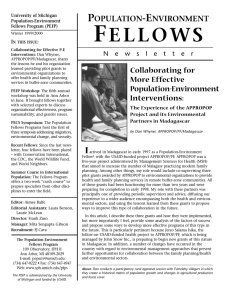The Population-Environment Fellows Program The University of Michigan
advertisement

The University of Michigan The Population-Environment Fellows Program 1214 South University, 2nd Floor Ann Arbor, MI 48104 734-763-9456 • Fax 734-647-0643 E-mail: popenv@umich.edu Web site: www.sph.umich.edu/pfps After seven years in the population-environment field, we've found the best way to develop programs that protect the environment – and the people who depend on it. We implement them. This is why the Population-Environment Fellows Program was created. It provides an important means for environmental, population, and development organizations to test and refine projects that offer: • people-centered alternatives to “fences and fines” conservation tactics; and • a means to ease the environmental and human costs of population growth, unsustainable resource use, rural-to-rural migration, and rapid urbanization. Two years to test, learn and refine The Program does this by placing early-career professionals on two-year assignments in developing countries, where they offer technical assistance in applied research, program design, and policy development to NGOs and government ministries. To date, Fellows have worked in 22 countries with organizations such as the National Audubon Society, CARE, Conservation International, The Nature Conservancy, The World Conservation Union, World Neighbors, the World Wildlife Fund, and their local partners on important issues such as: • Developing partnerships among environmental and reproductive health/family planning NGOs to explore efficiencies in providing enironmental education, appropriate technology transfer, and reproductive health services to buffer zone communities; • Designing and implementing participatory management plans for ecological reserves, including sustainable resource use and income generation projects; • Using participatory techniques to determine the forces driving migration into protected areas, assessing migrant practices and their environmental impact, and examining the effectiveness of policies designed to mitigate it; • Conducting cost-benefit analyses of adding family planning services to an organization’s environmental and economic development portfolio; and • Identifying and documenting successful practices in urban environmental management. Developing solutions that benefit us all The lessons learned from Fellows’ efforts have helped their organizations better understand the relationships among population change, environmental degradation, and poverty that lie at the heart of many quality of life problems within the developing world. But because these relationships also drive broader issues from rainforest depletion and species loss to illegal immigration and resource-driven conflict, the solutions Fellows discover have the potential to benefit not only the communities they serve – but communities right here in the US as well. “Population-Environment Fellows have helped TNC identify linkages between our current protected areas programs, local people projects, and population issues – as well as areas in which we may want to broaden and strengthen those linkages. With support from the Fellows Program, TNC’s conservation strategy has become increasingly tied with population and environment interventions. We are very satisfied with the results.” – Gregory Miller, Vice President The Nature Conservancy






